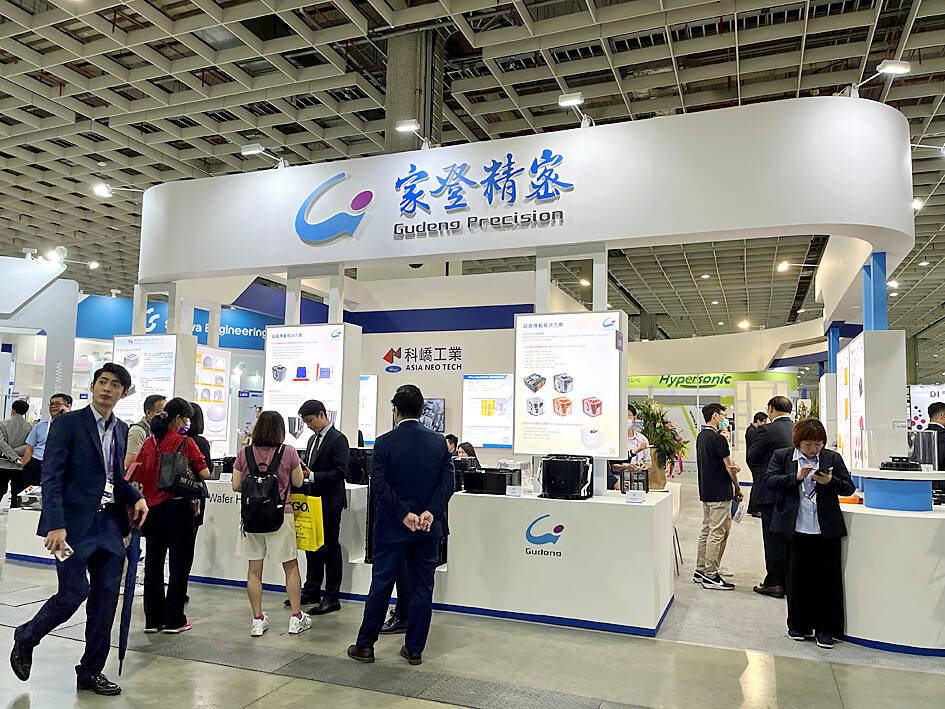Gudeng Precision Industrial Co (家登精密) yesterday said it is developing an artificial intelligence (AI) server cooling system with Giga Computing Co (技剛科技) to help customers reduce energy consumption.
“Our cooperation will produce supplementary effects and pave the way for us to address the global cooling system market,” Gudeng chairman Bill Chiu (邱銘乾) said of the new-generation two-phase liquid immersion cooling system at a news conference in Taipei.
Gudeng owns a 20 percent share in Giga Computing, which already supplies one-phase liquid immersion cooling systems that account for 76 percent of the immersion cooling system market, while two-phase immersion cooling systems make up 24 percent, Chiu said.

Photo: Grace Hung, Taipei Times
Two-phase immersion cooling systems use power more efficiently than one-phase models, and more customers have shifted to the new systems for AI servers, he said.
Gudeng is the sole extreme ultraviolet (EUV) pod supplier to Taiwan Semiconductor Manufacturing Co (台積電).
The company is optimistic about the growth of its core EUV pod and wafer pods, which are box-like front-opening unified pods for shipping, transporting and storing wafers during the chipmaking process.
“We are benefiting from the overall [semiconductor] market’s growth as we play a crucial role in the whole semiconductor supply chain,” Chiu said. “We have the chance to see our revenue reach NT$6 billion [US$187.38 million] or NT$7 billion this year.”
That represented an upward revision to the company’s earlier revenue forecast, of 20 percent annually this year from NT$5.08 billion last year. The new forecast means an annual increase of between 18 and 38 percent.
The company is targeting NT$10 billion in revenue next year, Chiu said.
The revenue growth is mainly fueled by customer demand from Taiwan and China, accounting for 46 percent and 35 percent of the company’s total revenue respectively, ahead of the US at 15 percent.
Gudeng’s revenue soared 36.91 percent annually to NT$3.82 billion during the first seven months of this year, compared with NT$2.79 billion a year earlier.

ADVANCED: Previously, Taiwanese chip companies were restricted from building overseas fabs with technology less than two generations behind domestic factories Taiwan Semiconductor Manufacturing Co (TSMC, 台積電), a major chip supplier to Nvidia Corp, would no longer be restricted from investing in next-generation 2-nanometer chip production in the US, the Ministry of Economic Affairs said yesterday. However, the ministry added that the world’s biggest contract chipmaker would not be making any reckless decisions, given the weight of its up to US$30 billion investment. To safeguard Taiwan’s chip technology advantages, the government has barred local chipmakers from making chips using more advanced technologies at their overseas factories, in China particularly. Chipmakers were previously only allowed to produce chips using less advanced technologies, specifically

The New Taiwan dollar is on the verge of overtaking the yuan as Asia’s best carry-trade target given its lower risk of interest-rate and currency volatility. A strategy of borrowing the New Taiwan dollar to invest in higher-yielding alternatives has generated the second-highest return over the past month among Asian currencies behind the yuan, based on the Sharpe ratio that measures risk-adjusted relative returns. The New Taiwan dollar may soon replace its Chinese peer as the region’s favored carry trade tool, analysts say, citing Beijing’s efforts to support the yuan that can create wild swings in borrowing costs. In contrast,

BRAVE NEW WORLD: Nvidia believes that AI would fuel a new industrial revolution and would ‘do whatever we can’ to guide US AI policy, CEO Jensen Huang said Nvidia Corp cofounder and chief executive officer Jensen Huang (黃仁勳) on Tuesday said he is ready to meet US president-elect Donald Trump and offer his help to the incoming administration. “I’d be delighted to go see him and congratulate him, and do whatever we can to make this administration succeed,” Huang said in an interview with Bloomberg Television, adding that he has not been invited to visit Trump’s home base at Mar-a-Lago in Florida yet. As head of the world’s most valuable chipmaker, Huang has an opportunity to help steer the administration’s artificial intelligence (AI) policy at a moment of rapid change.

TARIFF SURGE: The strong performance could be attributed to the growing artificial intelligence device market and mass orders ahead of potential US tariffs, analysts said The combined revenue of companies listed on the Taiwan Stock Exchange and the Taipei Exchange for the whole of last year totaled NT$44.66 trillion (US$1.35 trillion), up 12.8 percent year-on-year and hit a record high, data compiled by investment consulting firm CMoney showed on Saturday. The result came after listed firms reported a 23.92 percent annual increase in combined revenue for last month at NT$4.1 trillion, the second-highest for the month of December on record, and posted a 15.63 percent rise in combined revenue for the December quarter at NT$12.25 billion, the highest quarterly figure ever, the data showed. Analysts attributed the